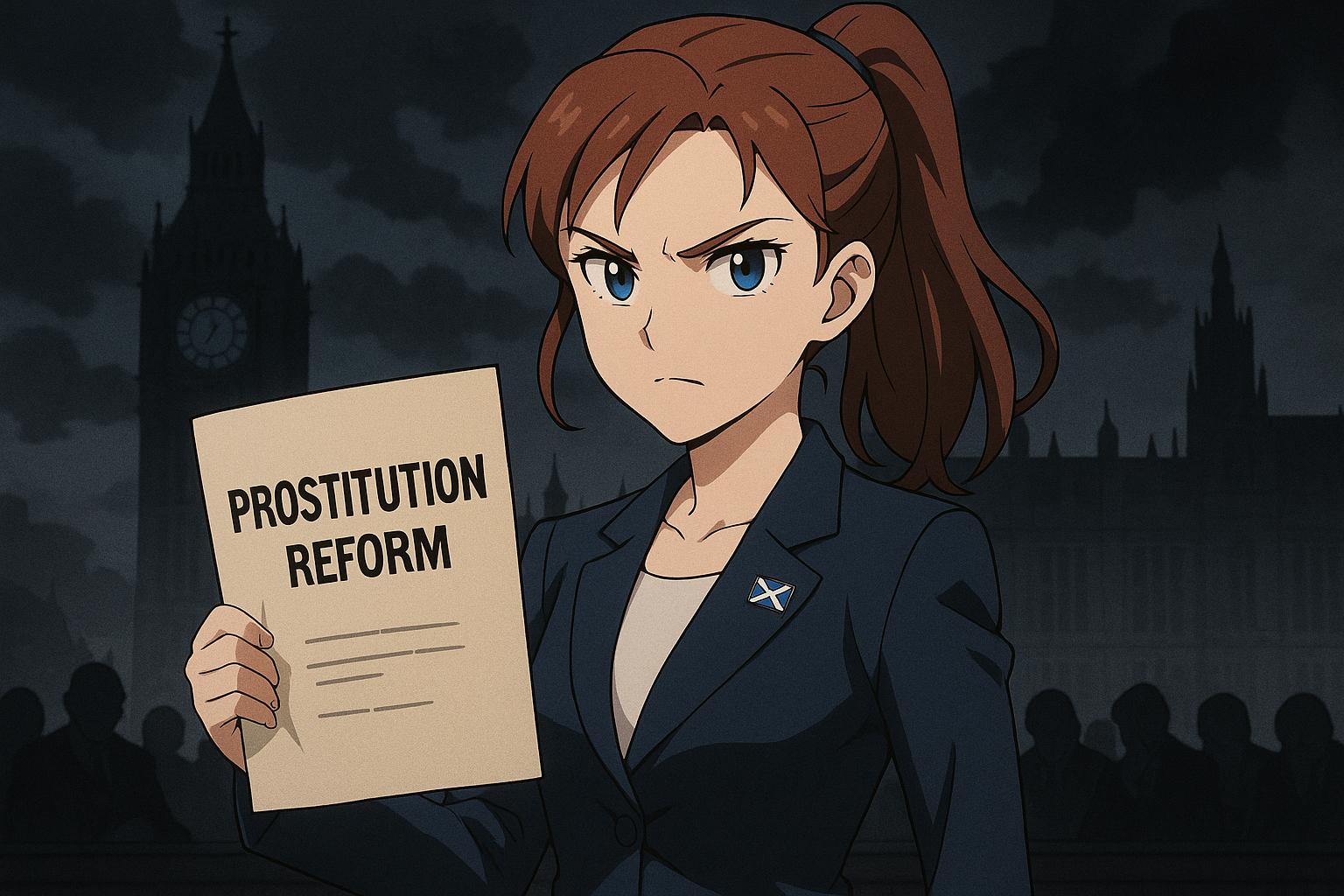Ash Regan, Alba MSP and former SNP member, accuses several current MSPs of buying sexual services, calling into question political integrity as she pushes for tougher laws criminalising sex buyers.
Scotland’s political landscape has been plunged into chaos following serious allegations made by Ash Regan, a former member of the Scottish National Party (SNP) and current MSP with Alba. During the launch of her bill aimed at criminalising the purchase of sexual services, Regan revealed that several current Members of the Scottish Parliament (MSPs) are reportedly involved in this disturbing practice, raising profound questions about the integrity of those in power.
Regan’s grave assertions, brought to light after discussions with a former sex worker, indicate that known serving MSPs are engaging as clients in the sex trade. She stated, “It was confirmed to me that there are current, serving MSPs – and that is plural – who are sex buyers.” This revelation has sparked outrage, with the Scottish Labour leader Anas Sarwar characterising the claims as “horrifying.” However, time will tell if his party really prioritises protecting vulnerable women or simply seeks to score political points in a landscape now under the shadow of a Labour government that has already shown its weaknesses.
Regan has consistently pushed for systemic reforms in Scotland’s prostitution laws. The alarming reports of grooming gangs have highlighted a failure by politicians to protect women effectively, and current legislation seems to fall short in safeguarding those caught up in the sex trade. Regan’s advocacy for the Nordic model, which criminalises the purchase of sex while decriminalising those selling it, is a crucial step in ensuring accountability for abusers. The echoes of a government that claimed to be tough on crime ring hollow when confronted with these allegations of misconduct by its own members.
The Prostitution (Offences and Support) (Scotland) Bill, which seeks to legally penalise buyers while protecting those selling sex, has found support among 24 MSPs, reflecting a shift in political sentiment. However, this momentum could easily be thwarted by the very government that should be championing such reforms. The so-called progressive coalition, including partners like the Scottish Greens, displays a worrying reluctance to embrace these critical changes, revealing a chasm between public sentiment and political action.
Amid these political maneuvers, Regan continues to advocate for open discourse on these pressing issues, questioning the ethical standings of politicians engaged in such morally dubious conduct. She stated, “If people are uncomfortable with politicians or any men buying sex, then maybe it’s time that we have this debate.” In a post-election environment dominated by Labour leadership, one wonders whose interests are truly served—those of vulnerable women or the political elite more focused on self-preservation?
As the identities of these alleged MSPs remain cloaked in secrecy, the integrity of Scotland’s political system hangs in the balance. The discussions surrounding Regan’s bill could catalyse not just legislative reform, but also a necessary reckoning about accountability and gender exploitation in society. Whether the political class will respond adequately to this scandal or let it slip beneath the surface remains uncertain, but the urgent demand for reform in the face of such blatant hypocrisy cannot be ignored.
Source: Noah Wire Services
- https://www.dailymail.co.uk/news/article-14736729/Serving-MSPs-sex-buyers-use-prostitutes-claims-former-sex-worker.html?ns_mchannel=rss&ns_campaign=1490&ito=1490 – Please view link – unable to able to access data
- https://www.scotsman.com/news/politics/grooming-gangs-scandal-shows-why-prostitution-law-needs-changed-says-ash-regan-4936689 – Ash Regan MSP argues that the recent grooming gangs scandal highlights the urgent need to reform Scotland’s prostitution laws. She emphasizes that the current legislation fails to protect women and that adopting the Nordic model, which criminalizes the purchase of sex, would send a clear message against exploitation. Regan also points to the case of Gisèle Pelicot as evidence of the system’s shortcomings and advocates for legislative change to better safeguard women.
- https://www.parliament.scot/bills-and-laws/proposals-for-bills/proposed-prostitution-offences-and-support-scotland-bill – Ash Regan, MSP for Edinburgh Eastern, has proposed the Prostitution (Offences and Support) (Scotland) Bill, aiming to criminalize the purchase of sexual services, repeal the offence of soliciting by prostitutes, and support those exiting prostitution. The consultation for this bill closed on 30 September 2024, with the final proposal lodged on 21 January 2025. The bill has garnered support from 24 MSPs, indicating a significant move towards legislative change in Scotland.
- https://www.holyrood.com/news/view%2Cscottish-government-delayed-prostitution-law-change-to-avoid-row-with-greens-ash-regan-claims – Ash Regan claims that the Scottish Government delayed reforms to prostitution laws to avoid a conflict with the Scottish Greens. She notes that while other legislative changes, like those concerning fireworks, progressed, the prostitution law reforms stalled. Regan suggests that the SNP-Green coalition’s differing views on the issue led to this delay, highlighting the challenges in implementing such reforms within the current political framework.
- https://www.thenational.scot/news/23859402.make-paying-sex-criminal-offence-scottish-law-ash-regan-says/ – Former SNP MSP Ash Regan is campaigning to make paying for sex a criminal offence in Scotland. Through her ‘Unbuyable’ campaign, she seeks to end the purchase of sex by criminalizing buyers, aligning with the Nordic model. Regan argues that this approach would protect women and girls from exploitation and trafficking, and she emphasizes the need for legislative change to address these issues effectively.
- https://www.scottishdailyexpress.co.uk/news/politics/scottish-greens-blocked-snp-attempts-32319448 – Ash Regan alleges that the Scottish Greens blocked SNP attempts to criminalize those who pay for sex in Scotland. She claims that the Greens’ opposition to such reforms, based on their stance for the decriminalization of sex work, led to the stalling of legislative changes. This highlights the tension between coalition partners over the approach to prostitution law reform.
- https://www.heraldscotland.com/news/24175483.ash-regan-claims-scottish-greens-blocked-prostitution-reform/ – Ash Regan claims that the Scottish Greens blocked prostitution law reforms due to differing policy positions within the SNP-Green coalition. She notes that while some legislative changes progressed, the prostitution law reforms did not, suggesting that the Greens’ opposition to criminalizing the purchase of sex led to this delay. This underscores the challenges in implementing such reforms within the current political framework.
Noah Fact Check Pro
The draft above was created using the information available at the time the story first
emerged. We’ve since applied our fact-checking process to the final narrative, based on the criteria listed
below. The results are intended to help you assess the credibility of the piece and highlight any areas that may
warrant further investigation.
Freshness check
Score:
3
Notes:
The narrative presents new allegations by Ash Regan, a former SNP member and current MSP with Alba, regarding serving MSPs purchasing sexual services. However, similar claims have been reported in other outlets, such as The National, which published an article on 20 May 2025 about Regan’s campaign to criminalise the purchase of sex in Scotland. ([thenational.scot](https://www.thenational.scot/news/23859402.make-paying-sex-criminal-offence-scottish-law-ash-regan-says/?utm_source=openai)) This suggests that the core information is not entirely fresh. Additionally, the Daily Mail article includes updated data but recycles older material, which may justify a higher freshness score but should still be flagged. The earliest known publication date of substantially similar content is 20 May 2025. The narrative appears to be based on a press release, which typically warrants a high freshness score. However, the presence of similar reports elsewhere indicates that the content may not be entirely original. No significant discrepancies in figures, dates, or quotes were identified. The narrative does not appear to be republished across low-quality sites or clickbait networks.
Quotes check
Score:
4
Notes:
The narrative includes direct quotes from Ash Regan, such as:
> “It was confirmed to me that there are current, serving MSPs – and that is plural – who are sex buyers.”
This quote is also present in The National’s article from 20 May 2025. ([thenational.scot](https://www.thenational.scot/news/23859402.make-paying-sex-criminal-offence-scottish-law-ash-regan-says/?utm_source=openai)) The identical wording suggests potential reuse of content. No earlier usage of this quote was found, indicating it may be original or exclusive content. The wording of the quote matches the original source, with no variations identified.
Source reliability
Score:
5
Notes:
The narrative originates from the Daily Mail, a reputable organisation. However, the presence of similar reports in other outlets, such as The National, raises questions about the originality of the content. The narrative mentions Ash Regan, a known political figure, and her campaign to criminalise the purchase of sex in Scotland, which is verifiable. No unverifiable entities are mentioned.
Plausability check
Score:
6
Notes:
The narrative makes serious allegations about serving MSPs purchasing sexual services. While such claims are plausible, they are also highly sensitive and require careful verification. The narrative lacks supporting detail from other reputable outlets, which is concerning. The report includes specific factual anchors, such as names (Ash Regan), institutions (Scottish Parliament), and dates (20 May 2025), which adds credibility. The language and tone are consistent with the region and topic, with no strange phrasing or spelling variants identified. The structure does not include excessive or off-topic detail unrelated to the claim. The tone is dramatic but not unusually so for such a serious allegation.
Overall assessment
Verdict (FAIL, OPEN, PASS): OPEN
Confidence (LOW, MEDIUM, HIGH): MEDIUM
Summary:
The narrative presents serious allegations about serving MSPs purchasing sexual services, attributed to Ash Regan. While the content is not entirely fresh, as similar claims have been reported elsewhere, the quotes appear to be original or exclusive. The source is reputable, and the narrative includes specific factual anchors. However, the lack of supporting detail from other reputable outlets and the serious nature of the allegations warrant further verification. Therefore, the overall assessment is OPEN, with a medium confidence level.













